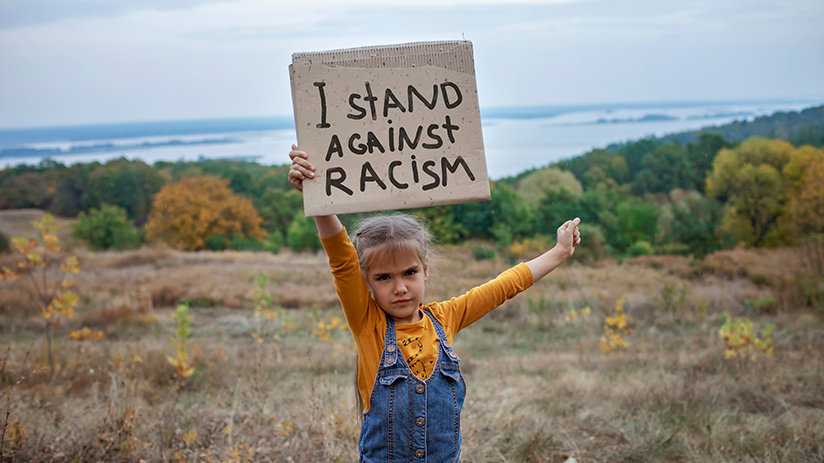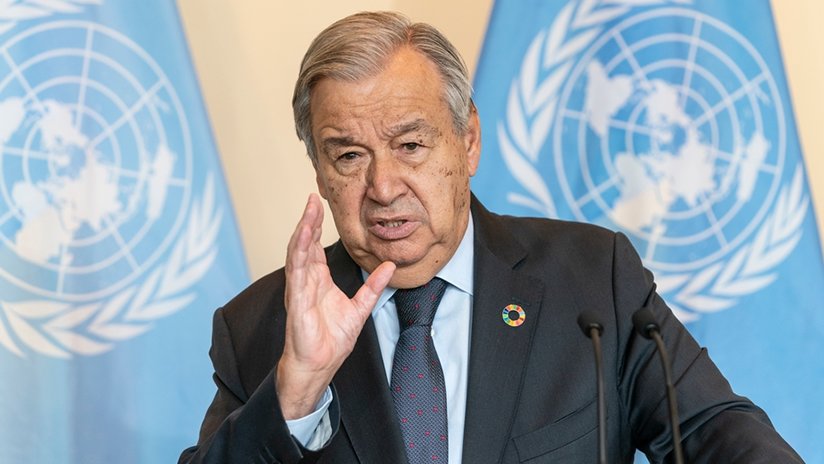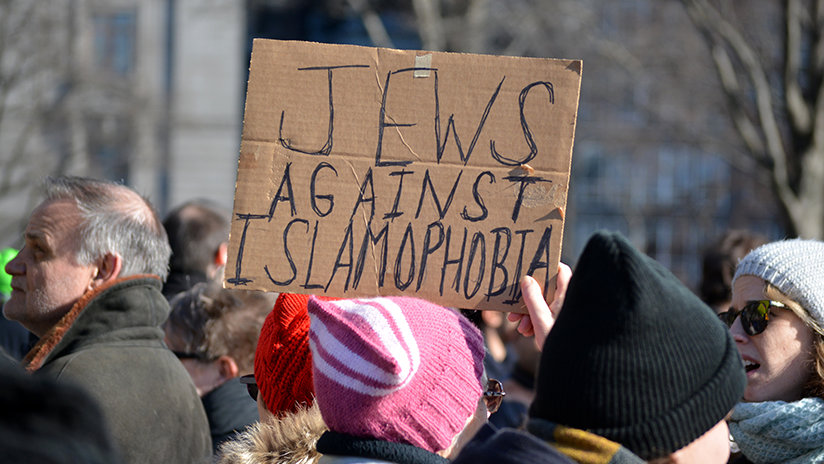
-
HOME
-
WHAT IS STANDOur Mission Our Values Our Help Contact
-
WHAT WE FIGHT FORReligious Freedom Religious Literacy Equality & Human Rights Inclusion & Respect Free Speech Responsible Journalism Corporate Accountability
-
RESOURCESExpert Studies Landmark Decisions White Papers FAQs David Miscavige Religious Freedom Resource Center Freedom of Religion & Human Rights Topic Index Priest-Penitent Privilege Islamophobia
-
HATE MONITORBiased Media Propagandists Hatemongers False Experts Hate Monitor Blog
-
NEWSROOMNews Media Watch Videos Blog
-
TAKE ACTIONCombat Hate & Discrimination Champion Freedom of Religion Demand Accountability
STAND Considers United Nations Combat of Hate Speech a Good Sign
UN Secretary-General António Guterres delivered an insightful speech when he launched the Fez Plan of Action to prevent hate speech as an incitement to acts of atrocity. The Fez Plan, drawn up in April 2015 in Fez, Morocco, addresses hate speech which causes atrocities against people of religion.
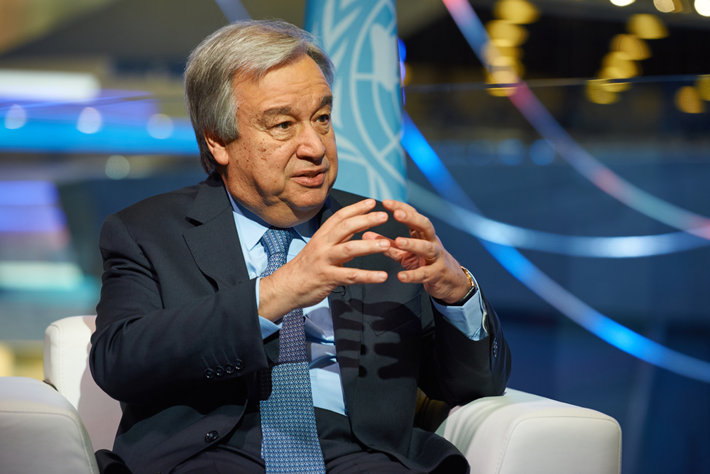
Unlike other legislation, which addresses only resultant damage instigated by the incitements, the Fez Plan seeks to confront and resolve the original provocation.
Religious leaders of many faiths were involved in the original discussions from which this planning was developed. Consequently it retains a coordinated and multiperspective approach to the problem.
Secretary-General Guterres concluded his comments on the Fez Action Plan by stating in part:
“Hate speech sows the seeds of suspicion, mistrust and intolerance…
“And so it is no surprise that hate speech is one of the most common warning signs of atrocity crimes – genocide, war crimes and crimes against humanity.”
STAND considers it a positive sign that the United Nations and its General-Secretary are taking this issue seriously and are proactive in addressing it.
It is observed that there are a small number of individuals who lurk in the background stirring hatred against people of faith. Hatemongers sit hunched over computers in backrooms, or buried in underground bunkers, slavishly hacking out venom on unsuspecting targets via internet groups and other channels. Theirs is a life of deceit, fear, intolerance and evil.
That they hide behind First Amendment protections of free speech while abusing the very decency it sought to achieve is part of their protection racket. They have been described as a cancer permeating our entire race to bring its collapse through discord and resulting atrocity.
“Hate speech sows the seeds of suspicion, mistrust and intolerance. And so it is no surprise that hate speech is one of the most common warning signs of atrocity crimes – genocide, war crimes and crimes against humanity.”
That the Secretary-General of the United Nations is taking a stand against religious hatred and so alleviate the atrocities that result, rings a positive bell for faith and humanity.
As STAND’s International Director, I can say that I am heartened that Mr. Guterres has taken this position as it means the United Nations shoulder is added to the wheel to stop the atrocities and bring harmony where it counts. It really is important.
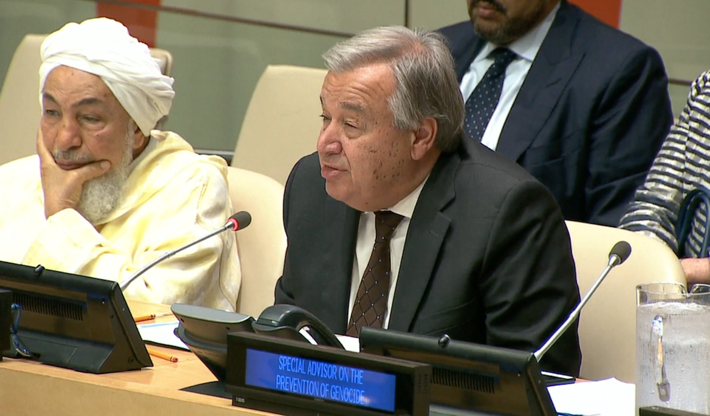
14 July 2017
Secretary-General's remarks on the Launch of the Fez Plan of Action [as delivered]
Watch the video on webtv.un.org:
Let me begin by thanking you for coming together in this deeply meaningful way – and on such a timely initiative.
I firmly believe in the power of faith leaders to shape our world for good.
As High Commissioner for Refugees, I made a special effort to reach out to faith leaders.
I did so out of personal conviction. But I also did so for very practical reasons.
After all, to the vast majority of people uprooted from their homes, faith is an anchor in a stormy sea of fear, loss, separation and destitution.
We worked together with religious leaders on a project that focused on the roots of modern refugee law and Islamic law. We did it in close cooperation with the Organization of Islamic Cooperation and with the support of Nayef University in Riyadh.
More broadly, we brought in UNHCR, religious leaders together for a dialogue on faith and protection.
Again and again, I have been struck by the consonance of key precepts and core values between the different faiths.
Indeed faith is central to hope and resilience.
Yet around the world, we see how religion is being twisted – cynically manipulated – to justify incitement to violence and discrimination.
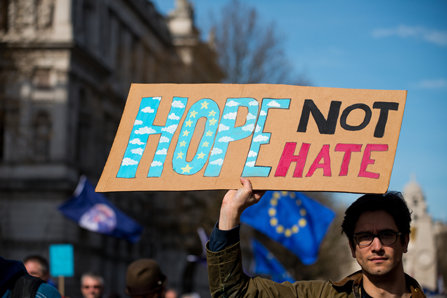
We see an alarming rise in online and offline hate speech -- messages that spread hostility and hatred and encourage populations to commit violence against individuals or communities, often based on their identity.
Hate speech sows the seeds of suspicion, mistrust and intolerance.
Over time, it can play an important role in convincing people that violence is logical, justifiable, even necessary.
And so it is no surprise that hate speech is one of the most common warning signs of atrocity crimes – genocide, war crimes and crimes against humanity.
Since we know the warning signs, we can also take early action to prevent these crimes.
The voice, the authority, and the example of religious leaders are critical.
This conviction led to the development of the initiative we launch today.
The Fez Plan of Action is the product of two years of consultations, led by my Special Adviser on the Prevention of Genocide. It involved religious leaders representing different faiths around the world, as well as faith based organisations and many others.
I would like to pay tribute to the critical role of many partners, and in particular KAICIID, the Network for Religious and Traditional Peacemakers and the World Council of Churches.
“All religions teach respect for life, and recognize human beings as fundamentally equal. These principles summon us to show respect for all human beings, even those with whom we might profoundly disagree or whose cultures might seem alien.”
The Plan is based on a unifying commitment to promote peace, understanding, mutual respect and the fundamental rights of all people. This includes the rights to freedom of religion and belief, opinion and expression, and peaceful association.
The Plan of Action sets out a broad range of ways in which religious leaders can prevent incitement to violence and contribute to peace and stability.
It stresses the importance of women and youth in all prevention initiatives.
It also contains recommendations for States and the international community.
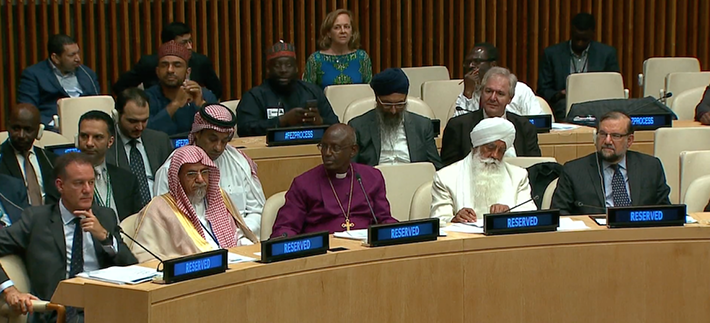
All religions teach respect for life, and recognize human beings as fundamentally equal.
These principles summon us to show respect for all human beings, even those with whom we might profoundly disagree or whose cultures might seem alien.
I urge the widest possible dissemination and implementation of this Plan of Action.
It can help to save lives, reduce suffering, and realize our shared vision of a peaceful, inclusive and just societies in which diversity is valued and the rights of all individuals are protected.
Let us work together to prevent and end atrocity crimes and all affronts to human rights and dignity.
Thank you.
Photos by: United Nations / Truba7113 / John Gomez / Shutterstock.com
Footage by: UNifeed






